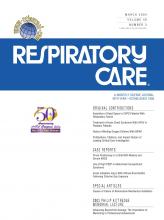Abstract
The profession of respiratory care is founded on rigorous scientific research, which in turn depends on rigorous training in research methods. Only a small part of that training is from written and audiovisual materials; the most important aspects of becoming a respiratory researcher are learned from mentors. Becoming a thoroughly-involved respiratory care professional, then a researcher, and then a mentor is challenging but rich with the rewards of contributing to the advancement of science and, thereby, to the care and comfort of our patients. Becoming a respiratory researcher begins with attitude. Only those with a burning desire to excel, to discover truth, and to contribute to the advancement of the profession will persevere through the setbacks and bring a research project to final fruition. The second requirement for long-term success is learning to maintain balance between enthusiasm and realism. It is crucial to avoid taking on more than you can realistically do, and it is necessary to devote adequate time to your family and/or non-work-related pursuits and recreation. The third aspect of becoming a contributor to respiratory care research is rigorous and ongoing education in the techniques of respiratory care, the methods of medical research, and the basic sciences and mathematics that underlie the profession, including some calculus, engineering physics, and statistics. You must understand research design, critical analysis of research, and numerous aspects of presentation, including clear writing and concise speaking. The fourth aspect is accuracy: you must have a strong commitment to obtaining accurate, reproducible, and meaningful data. You must sustain strong attention to detail; mentors are essential because they teach the needed discipline, the required measurement skills, and how to select the appropriate equipment with which to conduct the research. Timing is the fifth aspect. In addition to planning and using your time wisely, you must learn what are realistic expectations about how long a project will take, when to ask for help, and when to stop because you have reached your physical or mental limit and you need to rest and devote some time to your nutrition and recreation. The sixth aspect is speed: having achieved the basic skills and gained a fair amount of experience, your efficiency improves and you begin to achieve more in a day; you begin to start mentoring others; you can confidently and quickly handle multiple projects; if you don't know the answers you know where to find them; you are seen as an authority and people ask you for consultations and presentations and to participate in committees. The final aspect is power, meaning that your practice of respiratory care reaches a level at which you meet challenges for which you feel you have no response in memory and yet you succeed.
Footnotes
- Correspondence: Robert L Chatburn RRT-NPS FAARC, Respiratory Care Department, University Hospitals of Cleveland, 11100 Euclid Avenue, Cleveland OH 44106. E-mail: robert.chatburn{at}uhhs.com.
- Copyright © 2004 by Daedalus Enterprises Inc.











